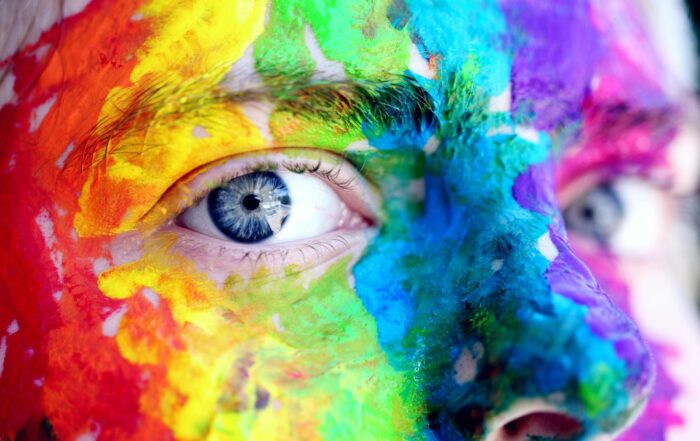
Mental health challenges are on the rise for Americans across the country. And especially after the past few years of public health and political turmoil, the statistics are staggering. It’s estimated that nearly 20 percent of adults are currently struggling with their mental health. That’s just about 50 million Americans!
Access to mental healthcare can be difficult for many Americans. It’s particularly hard for members of ethnic and racial minority groups to find culturally sensitive therapy.
This is true for a lot of reasons—and we can’t underestimate the impact of a society that leaves some of its most vulnerable members consistently without reliable access to the things they need the most.
Even beyond systemic inequity are the uniquely cultural barriers that can stand at odds with recognizing the need for or seeking care for mental health struggles.
Mental Health Across the United States
So let’s lay the foundation first: what does mental health care look like in the United States? Who’s providing it, and who’s accessing it? And how does this compare with who needs this kind of care?
“Mental illness” is generally defined as a diagnosable mental, emotional, or behavioral disorder that can be classified as mild, moderate, or severe.
It’s enormously prevalent in the US—after all, fifty million people is a lot of people. And that’s just the number who have received some kind of care. Imagine how high the number would be if we knew of everyone, nationwide, who struggles with anxiety, depression, or another mental health challenge they haven’t told a doctor or therapist about.
An outsider looking in might assume that, because mental health struggles are so common amongst our population, treatment is easy to come by—that it’s the norm.
But like most things in the US healthcare system, mental health treatment can come with a high price tag. And even if someone can afford the service itself, there’s no guarantee they’ll be able to receive care regularly if they need to work multiple jobs, find affordable dependent care, or ensure reliable transportation.
These things aren’t especially easy for most Americans. However, they tend to be more difficult for those living at or below the poverty line. And since poverty itself can cause trauma,1 those who experience these challenges are often the ones who need help the most.
This can explain some of the disparities in mental health care and culturally sensitive therapy by racial and ethnic lines in the US—poverty also trends along these lines.
But access isn’t the only reason certain groups of people are less likely to seek mental health care.
Why We Seek Mental Health Care
When we think about mental health care, we might also think about the struggles we hear about most in the media… Things like depression, anxiety, or substance abuse. And these are absolutely reasons to seek help from mental health professionals.
However, we tend to think about these as isolated, standalone things. So, if we don’t think of ourselves as “someone with depression” or “someone with anxiety,” for example, we might not recognize the signs or even think about the underlying causes.
In reality, there are a lot of reasons someone might meet with a therapist. They could be dealing with a major life transition like a job loss, a difficult medical diagnosis, or the death of a loved one.
Even “fun” transitions like marriage, new parenthood, or a long-awaited retirement can result in a lot of stress or anxiety.
Maybe nothing particular has changed in someone’s life, but they find themselves unhappy, restless, or dissatisfied. They can’t seem to reach their goals, for example, or are struggling to even pinpoint what these goals might be.
Perhaps someone is struggling to figure out their own identity or navigating a lack of acceptance from their loved ones.
Life is full of challenges, and any one of them could result in mental health issues at any time. The reasons someone might need extra support or guidance are truly endless.

The Importance of Culturally Sensitive Therapy
But while the general presentation of mental health care in major media markets across the US is that system of “support and guidance,” it’s not necessarily looked upon that way by every cultural group.
Sometimes, that’s because the system doesn’t always work the way it should. In under-resourced areas—often heavily populated by racial and ethnic minorities—the accessibility and quality of mental health care may be lower than in more affluent places. There may be fewer therapists in general, for example, or those who specialize in specific concerns might be carrying larger-than-average caseloads.
Those seeking services may feel less accepted or understood by providers who don’t look like them or share their background—it may be harder to find practitioners, in fact, who do.
This is an issue for many reasons… Not least of which is because the Americanization of mental health—the belief that anxiety, depression, or other disorders look or present a particular way and are separate from physical health—tends to erase the nuances of actual, lived experience. And lived experience can be strongly shaped by heritage and cultural beliefs.
So in cases where an individual’s mental health concerns are tied to an intersectional experience, a therapist who does not share or intimately understand that experience may not be able to effectively address those concerns.
This often leaves patients feeling misunderstood and unsupported.
Cultural Barriers to Mental Health Care
The word acculturation refers to the process that happens when, for example, immigrant populations begin to adopt the predominant attitudes and behaviors of the society in which they’re now living.
And the level of acculturation present in any family can tend to be generational. Children who’ve grown up in the US, for example, tend to be more acculturated and more likely to reflect that experience than parents who moved from their home country. This is easy enough to understand—their lived experience has largely been that of an American kid.
Research has shown that lower levels of acculturation might result in stronger barriers to seeking and receiving care. And there can be a higher level of mental health struggle—depressive symptoms, for example.2
This, too, might seem fairly straightforward. Maybe there’s some social isolation, or a language barrier. Perhaps talking about challenges with someone outside the family just isn’t usually done. Maybe there are economic barriers, or a belief system that encourages targeting mental health issues through physician care, instead. In some cases, families might not even acknowledge the existence of mental health needs or believe they exist.
These are just a few examples of the many factors that may prevent members of ethnic and racial minorities from seeking mental health services here in the US.
Cultural Approaches to Mental Health
If you’re a first-generation American living with immigrant parents, or you come from a family with a strong deference to cultural heritage, this all might sound familiar.
Maybe you grew up hearing that feelings of sadness or anxiety should be met with a kind of toughness—the willpower to overcome these feelings on your own, without seeking professional help.
Or maybe your family encouraged the treatment of the physical self when you had psychological struggles. If you felt sad or unhappy, they cited exercise, weight loss or weight gain, certain foods, or other home remedies as the cure. Maybe you were told you shouldn’t feel down at all—maybe your family believed that you were given more resources than previous generations, and so your unhappiness signaled ungratefulness.
Others may have been encouraged to lean on faith or religion. Your church doctrine or community, for example, might be a great support in some situations. And there might be other times where it simply isn’t the best answer… Or, at least, not the only answer.
And sometimes, the most insidious of all—the belief that “troubles” stay within the family. Especially when that philosophy extends to things like abuse or significant trauma, this can be a really, really difficult thing to overcome.
Even if you’re older now or no longer live under your family’s roof, it can feel very hard to shake off deeply-held feelings of shame or stigma.
Choosing Culturally Sensitive Therapy
We’ve already talked about how prevalent mental health challenges are in the United States right now.
And while every single person is experiencing things that are, in some ways, unique to them, there tends to be a shared experience amongst first-generation Americans and other members of racial and ethnic minority groups.
So if you aren’t immediately enthusiastic about the idea of therapy—or if you’re struggling to take the first step toward pursuing mental health care—then you aren’t alone.
Your feelings are valid.
But here are some reasons to consider giving culturally sensitive therapy a try, just the same.
1. Generational trauma is real.
When we think about trauma, we usually think about those significant and difficult experiences we or others have had—the ones that have lasting impact.
But comparatively new research has backed up the idea of generational trauma, or trauma that was experienced by one generation and passed down to another.
This might happen in several ways. There’s some evidence to suggest that trauma can affect genetic processes, meaning it can be passed down literally through genes.
But it can also be transferred through beliefs and behaviors—things that show up regularly as parents and grandparents raise and care for children. As humans, we’re sometimes more observant than we consciously realize; we absorb and internalize much from our surroundings, including how those close to us interact with us, with each other, and with the rest of the world.
Depending on what our elders’ trauma includes—loss, sacrifice, poverty, abuse, even war—we can experience a whole host of impacts.
Therapy is a way for us to sift through and navigate our experiences with our caregivers’ trauma, in a safe and supportive environment that encourages healing and cycle-breaking.
2. You are straddling two worlds, and that’s a lot to shoulder.
Hailing from a family with a strong cultural heritage can be a really loving, beautiful thing! Traditions can endure far beyond geography, creating a rich tapestry of learning and experience for people growing up within them.
It can be difficult, though, when family traditions feel like they clash with the dominant cultural traditions of the United States.
That’s a wordy way of saying that we can feel like we’re split between two worlds. We’re not necessarily growing up in the same environment—with the same belief systems and cultural influences—as our parents. We may feel pulled to live our lives in a way that seems strange or even unacceptable to our loved ones.
It can be tough to feel like we truly fit in anywhere—especially when we’re on the receiving end of comments that frame our experience and affinity with either culture as a negative. We can wind up feeling like we’ve got “too much of” either culture for anyone to accept.
Working with a culturally sensitive therapist who understands can help us to identify our own values and start to build a framework for how to live a life that feels authentic and truly satisfying. They can help us set and maintain boundaries, strengthen communication with our families—and navigate the pushback if it comes.
3. Therapy is not about airing your family’s dirty laundry.
How often are we asked to keep our family’s secrets? Not to talk about anything deemed “bad” or “embarrassing,” lest we harm our family’s reputation?
Sometimes, this is because image tends to be truly important in our family’s culture. In other cases, our immigrant parents or grandparents might fear for our safety or ability to successfully navigate a society in which we’re the racial or ethnic minority.
Stereotypes and even “rules” for how we present ourselves and our families may have been relied upon in times or situations that felt unsafe for our elders.
But seeking culturally sensitive therapy isn’t the same as writing a tell-all book or casually chatting with a stranger. You’re entering into a therapeutic relationship where your therapist is generally required to keep your confidentiality.
It’s also a judgment-free space. Your therapist is there to help you navigate your own experience—not judge your family or what you’ve been through.
And while therapy is a great place to “let it all out,” there’s a larger purpose and direction to the conversation you’ll have with a culturally-sensitive therapist. Ultimately, you’ll be learning to address and work through your experiences in ways that help you better coexist with them.
4. Being a member of an ethnic or racial minority group can come with serious pressure.
It’s a very human desire to want to make our loved ones happy and proud of us.
And even in the best of situations—when our parents and caregivers really want us to be safe, healthy, and cared for—living up to others’ expectations can come with significant pressure.
Maybe we:
- Are the first to graduate college or the latest to uphold the family tradition;
- Help care for siblings or other family members;
- Have wildly-successful siblings or cousins (or even the children of family friends we’ve never met!) that we find ourselves compared to;
- Are encouraged to deny our own needs and push our mental health struggles aside;
- Feel like we grew up just a little bit faster because we had to do things like translate English for our parents…
Well. These things add up. They’re hard, and they feel heavy. Talking them out with a qualified and culturally sensitive therapist can help us gain some distance and feel out our own perspective.
How to Find Culturally Sensitive Therapy
It’s true—the vast majority of mental health providers in the United States aren’t people of color.3 This can make it pretty tough to find a therapist who looks like you or can relate to your cultural experience if you are someone of color.
After all, you’d rather not spend your time in therapy educating your therapist on the nuances of your lived experience.
But finding a therapist who can understand, relate to, and embrace your cultural background isn’t impossible, either.
Here are some things to consider when searching for culturally sensitive therapy.
Start locally.
Tap into any local or regional groups that share your background. Maybe this is a church, a senior center, or a cultural association. Do they know of any practitioners they’d recommend—specifically clinicians of color?
Talk to friends or family you feel safe with. Have they worked with any clinicians of color themselves, or heard good things about a provider in your area?
The COVID-19 pandemic has made online therapy even more popular—and many therapists are sticking with the model, even if they otherwise feel comfortable in person. This opens up your options, since you won’t have to worry about getting to or from their office. You just have to make sure you’re located in a state where that therapist is already licensed.
Search therapist directories.
There are many popular websites like Psychology Today that top the Google rankings. There are also many other therapist directories that can help you pinpoint a culturally sensitive therapist!
Some of these include:
- Asian Mental Health Collective
- Black Men Heal
- Black Virtual Wellness Directory
- Hurdle
- Inclusive Therapists
- InnoPsych
- Latinx Therapy
- Melanin & Mental Health
- National Queer & Trans Therapists of Color Network
- South Asian Therapists
- Therapy for Black Girls
- Therapy for Black Men
Google It!
When all else fails, try giving Google a try. Many therapists in private practice have websites that speak to their target client—and that could be you!
Keywords and phrases like “Latinx therapist near me” or “South Asian therapist in [your state]” can pull up the websites of therapists who fit the bill.
Ask Plenty of Questions
Most importantly, don’t be afraid to ask questions of any new therapist you’re working with.
You can ask about technique and approach, how they relate to your background, or what experience they’ve had working with and around your cultural concerns. Ask about both their successes and their challenges.
While you want to give any new relationship at least a couple of sessions before you decide it’s a good or not-so-good fit, there’s also no shame in moving on if it doesn’t feel like a good fit.
It’s important that you trust your therapist and can feel comfortable sharing your thoughts! If you’re in the state of Texas and interested in culturally sensitive therapy for the LGBTQIA+ or the Asian-American and Pacific Islander (AAPI) community, I’d love to hear from you! Learn more about working with me.








